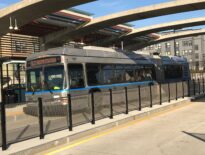
Rick Dimino
For decades, leaders in Massachusetts have searched for solutions that can fix our transit system, reduce traffic congestion and properly fund our road and bridge needs. Today, the Greater Boston region consistently leads the nation in poorly rated bridge and highway conditions, roadway traffic congestion, while the infrastructure at the MBTA is outdated, underfunded and consistently resulting in major failures. We are in need of new solutions. Fortunately, new effort is now underway that could mark a turning point in developing answers to our chronic transportation challenges.
Gov. Maura Healey recently created a new Transportation Funding Task Force that will make recommendations on what she termed a “long-term, sustainable transportation finance plan” for roads, bridges and transit needs throughout the commonwealth. This group includes representatives from the public and private sector and is asked to look at the “clean energy transformation of the transportation system,” as well as how to encourage transit-orientated housing and economic development. Their recommendations are due in December 2024.
We have seen multiple blue-ribbon commissions on transportation before, but this time should be different. There is a real sense of urgency, particularly because of the looming challenges with the MBTA budget. It is clear that if Massachusetts is unable to develop a new transportation finance plan, the MBTA is certain to get worse in the very near future.
Such an event would threaten the Greater Boston economy and reduce mobility options for people throughout Eastern Massachusetts. Also, if the MBTA is not able to improve performance, it will jeopardize the state’s climate emission and housing goals, both of which are key priorities of the Healey-Driscoll administration.
Key Voices Are in the Room
Secondly, the composition of this task force is very encouraging. It includes business groups who concentrate in the core area of the MBTA system, like the Greater Boston Chamber of Commerce, A Better City and the Massachusetts Competitive Partnership. There are representatives from the Worcester and Cape Cod Chamber of Commerce, respectively, as well as public health organizations, municipal government, and communities served by regional transit systems.
There is also direct participation from members of Gov. Healey’s cabinet and the chairs of the legislature’s joint transportation committee. This is an excellent group that will bring many important voices to the conversation.
Gov. Healey designed this group to act, rather than avoid the issue or deflect political pressure. The primary goal of the task force is to create a sustainable transportation finance plan. They won’t debate if there is a transportation funding need, rather it will focus on the established truth that there is a statewide funding challenge we need to hear options that address this gap.
This guidance is in contrast to both of Gov. Charlie Baker’s transportation commissions. In 2019, after years of pushing back against calls to increase funding for the MBTA, Gov. Baker created the Commission on the Future of Transportation. That group was charged with anticipating changes in the transportation sector that would happen by the year 2040, rather than finding answers to the fiscal crisis looming at the MBTA. Ironically, this futuristic commission did made a specific recommendation to “develop a fiscally sound and responsible transportation resource plan,” but that group left the details for a future administration.
Solutions Won’t Be Simple
While Healey’s team was given a straightforward mission, that does not mean the solutions it finds will be simple: The MBTA is approaching a fiscal cliff for both operating and capital repairs. The commuter rail system and bus networks are both relying on diesel vehicles, but transitioning these systems into a cleaner more efficient system will be expensive and the cost of the transition is not fully accounted for in the state’s capital spending plans. Finally, with the increase in electric vehicles for individual drivers, it will ultimately result in a decline in the statewide gasoline tax collections that support most transportation infrastructure maintenance and repairs.
To navigate this landscape, the task force should take a serious look at new approaches to highway tolling, especially with potential lessons from New York’s experience with variable-rate tolling in Manhattan. Any change in tolling policy might take time, but toll rates in Massachusetts have not changed since 2008. It long past time to bring some regional and social equity to Massachusetts current approach to tolling and learn from other states that use highway and tunnel rates as part of a comprehensive transportation pricing plan that partially supports transit needs.
The task force should also look at the potential long-term financing options for the Fair Share Amendment surtax and how it can be used for specific transportation infrastructure improvements. Also, the surcharge on an Uber or Lyft ride is only 20 cents in Massachusetts, while in other states these fees either exceed $1 or are calculated as a percentage of the total fare. The group should also explore new procurement methods and public private partnerships to help achieve our shared goals and benefits from transportation investments.
As the Transportation Funding Task Force begins its work this month, it is essential to recognize and commend Gov. Healey for creating this group and process. This group is capable and should help finally solve a problem that has plagued Massachusetts for decades.
Rick Dimino is president emeritus of A Better City and a member of the MassDOT board of directors.




 |
| 
